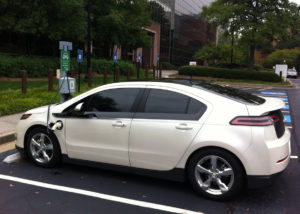
Reimagining the way we fuel our lives: Workplace EV Charging
 One of the most frequent sources of hesitation when buying an electric vehicle (EV) is the question, “Where will I charge my EV?” We’ve all lived our entire lives in a world where the only place to juice up your car is a gas station. This means we’ve been trained to think the only way to refuel a vehicle is to visit a specific location designed for precisely this task. When we ask the question, “Where will I charge my EV?” we expect to be shown a map of all of the EV charging stations around the country, or at least a plan to build them.
One of the most frequent sources of hesitation when buying an electric vehicle (EV) is the question, “Where will I charge my EV?” We’ve all lived our entire lives in a world where the only place to juice up your car is a gas station. This means we’ve been trained to think the only way to refuel a vehicle is to visit a specific location designed for precisely this task. When we ask the question, “Where will I charge my EV?” we expect to be shown a map of all of the EV charging stations around the country, or at least a plan to build them.
When it comes to EVs, our lives don’t have to revolve around stations dedicated to refueling our vehicles. Electricity is accessible, in principle, at every building connected to the electrical grid. No need for big trucks delivering our fuel to special and expensive holding tanks! All that is needed is access to a plug. The fuel an EV requires is virtually everywhere, so we are free to think about where EV chargers would be most convenient for our everyday lives.
Where does your vehicle spend most of its time? For most people, the answer to this question is at home and at work. If your daily routine means that your car spends most of its time parked at home and at work and both of these places are connected to the electrical grid, it only makes sense to recharge your EV at both of these locations. Why drive to a dedicated charging station to recharge after work when you could leave work with a full battery?

While workplace charging can be a convenient secondary charging location (after one’s home), for many, it can also sometimes be a necessary substitute for home charging. Renters, for example, are often unable to access a charging port at their homes and workplace charging can do a lot to address the issue of access to reliable charging for renters. Workplace charging just makes sense for homeowners and it is one of the best ways to ensure that EVs are a viable option for those who rent and don’t have access to a plug at home.
The following facts further support the focus on workplace charging:
- Most EVs leave home each morning fully charged.
- 78 percent of drivers travel less than 20 miles each way to work. 93 percent commute less than 35 miles.
- The range used for the daily commute can easily be regained using low-current charging at the workplace.
- Employees that are able to plug in at work are 6 times more likely to drive a plug-in vehicle.
Most EVs are capable of making the commute to work and back. Longer range EVs further diminish the demand for public charging and possibly increase the need for low-current charging at work. It is useful to think of a 300 mile range EV like the cordless phone, they must go back in the cradle to stay charged. This has been called the “A.B.C.” charging method: “Always Be Charging”. Low and slow charging keeps current EVs topped off.
Of course, this doesn’t mean that public charging stations are unnecessary. They are still a necessity for more long-distance trips. As the EV market has matured, demand for charing has bifurcated. The focus for public charging of EVs is shifting, on the one hand, to low-current, less costly home and workplace charging for around town, and, on the other hand, to DC Fast Charging for longer trips. One way to think of this split is “parking vs. fueling.” That is, low-current charging for long-duration “parking” and high-current charging to continue a longer trip, or “fueling.”
All indications tell us that we should expect the rapid proliferation of EVs over the next decade and workplace charging will be a key factor in their advancement and in making them a convenient aspect of our everyday lives.

The Rochester Electric Vehicle Accelerator (ROC EV) recognizes the importance of workplace charging and is partnering with local businesses to encourage employers to offer on-site charging for their employees. For more information on how your company can get involved in the 2018 Workplace Charging Challenge, contact us at info@RochesterEVs.com.
Sources:
https://www.denverpost.com/2017/12/31/ev-revolution-charging-stations-city-of-denver/
https://energy.gov/eere/articles/electric-vehicle-charging-coming-federal-workplace-near-you
U.S. Department of Transportation, Bureau of Transportation Statistics, Omnibus Household Survey (2014).
Drive Electric Northern Colorado